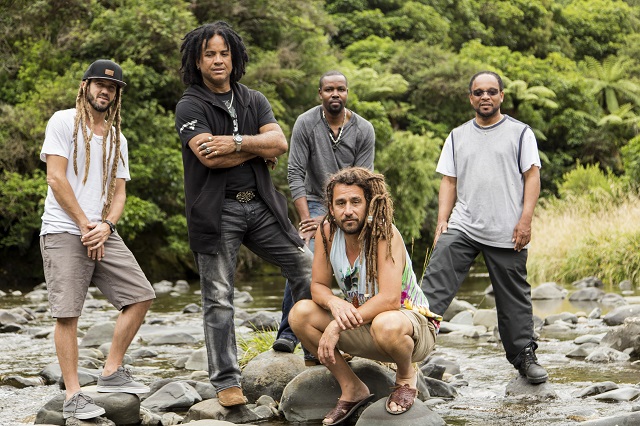Big Mountain: ‘India Had a Huge Influence on Reggae in the Nineties’
The “Baby I Love Your Way” hitmakers on touring India and reggae’s anti-colonialism roots

Big Mountain. Photo: Courtesy of the artist
When “Baby I Love Your Way” hitmakers Big Mountain first started recording reggae albums, the music industry was still on two-inch analog tapes and musicians still made money off of selling records. In other words, they’ve been around for a while. “We saw the whole industry change; we saw the whole digital revolution happen. We saw the whole record industry fall apart”¦ It was a trip,” says Joaquin “Quino” McWhinney, founder and frontman of the American band. “I make a little bit of money from royalties, but it’s not anything like it used to be back in the day. Now, you have to tour if you want to be a working musician.”
And tour they have. Big Mountain, who are now in their 25th year together, have been touring steadily for the past year and a half. They arrived in India this past month, starting out in Mumbai and making stops in New Delhi and Bangalore. “India actually had a huge influence on reggae right around the Nineties,” says McWhinney. “When [British-Indian rapper] Apache Indian started mixing a lot of bhangra and using a lot of traditional Indian instruments, everybody got onto that. We were using tablas in our music.”
In their latest single, “24 hours,” a collab with pop singer Shibani Kashyap, Big Mountain returns to the Indian-influenced reggae of the Nineties. While McWhinney sings the refrain in English, Kashyap’s verses are entirely in Hindi, and a sitar melody permeates the whole song. “Of course, India and Jamaica have an important connection: there’s a large population of Indians [in Jamaica], maybe just because of the whole British Commonwealth thing,” McWhinney notes. “In a subliminal way, reggae would not be what it is today if it wasn’t for Indian culture influencing us early on.”
If McWhinney speaks like an authority on the subject of reggae, it’s because he is one. Though Big Mountain began in 1992, McWhinney has been making reggae music since 1986, when he started his first band, Shiloh. Born to Mexican and part Native-American parents in California, McWhinney isn’t a homegrown talent like many of the Jamaican members in his band, but by this point, he’s carved a place for himself as a reggae insider. His bandmates are no less experienced: they count Ziggy Marley and the Wailers as their previous gigs.
Big Mountain have had its fair share of ups and downs, which is to be expected for any band with a decades-long career. In the early 2000s, after Big Mountain’s Nineties momentum and the standout success of their 1994 cover of Peter Frampton’s “Baby I Love Your Way” died down, McWhinney found himself jaded with the industry and ready for a break. “So I killed the band at that point, I let everybody know, ”˜I want to go back to school, and I’m not really feeling the industry right now,’” says McWhinney. After returning to university to complete his degree, McWhinney chose an unorthodox path for a reggae musician: he taught full-time at a high school in California for seven years.
“Teaching is hard work; there’s nothing harder than teaching,” says McWhinney, who taught multimedia and helped the school set up a music program and school band. His students were not unaware of their teacher’s unusual background: “We had fun with that,” McWhinney chuckles. “We would play “Baby I Love Your Way”; we would play Big Mountain music.” In those seven years, McWhinney came to a deeper understanding about his frustrations with the music business through the hard work he was putting into teaching. “I think I was a little spoiled, I think I was expecting too much for not enough work,” says McWhinney. “Once I really understood the work involved in teaching, I was able to come back to music with a fresh spirit and a fresh mind.”
When McWhinney returned to revive Big Mountain with renewed vigor, he was able to reunite most of the band’s pre-break lineup. The band put out an album, Perfect Summer, last year, and has been touring ever since. The world travel shows: McWhinney is able to reel off what the reggae scene is like in Fiji (“rootsy”), Hawaii (“Polynesian reggae is huge”), New Zealand (“Bob Marley is like a prophet to them”) and now India (“Over here, we were told, ”˜Stick to the pop stuff, don’t do too much of the rootsy stuff,’” he says dryly).
But McWhinney is quick to point out reggae’s one uniting factor across all of these countries. “Reggae is anti-colonialism music,” he explains. “Reggae really strikes a chord with everywhere that’s been colonized.” While McWhinney characterizes Big Mountain as a “family-friendly” band, he explains that they don’t shy away from being political, citing Bob Marley and Peter Tosh as reggae icons who were not afraid of speaking their minds. “In Jamaica, reggae was the way for [people] descended from slaves to look back and be proud of being African,” says McWhinney. “It really is about being proud of your culture, paying tribute your culture, honoring languages, honoring skin color, and getting past colonialism.”
Though reggae’s anti-colonialism message serves as a unifier for colonized peoples around the globe, McWhinney thinks that today’s political climate makes it even more relevant to oppressed communities everywhere. “I think the message that everybody needs to hear right now is unity among diverse people,” he says. “To me that’s the main message of reggae. It helps you heal from all those years of being told, ”˜You’re not good enough, you’re not as good as Europeans.’ [Making this music] is what you need to be doing to get back to feeling whole.”







